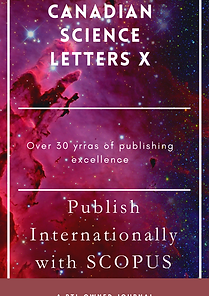Canadian Science Letters X
Physics Tomorrow Canadian Science Letters X (CSX) An SCOPUS-indexed monthly thrice peer-reviewed journal. CSX journal is an international, peer-reviewed, partial open-access journal on theoretical, & applied science, science and its applications published monthly online by Physics Tomorrow Letters.
Indexage
Indexed within Scopus, SCIE (Web of Science), CAPlus / SciFinder, Inspec, and many other databases.
Libre accès
Free for readers, with article processing charges (APC) paid by authors or their institutions.

Publication rapide
Manuscripts are peer-reviewed and a first decision provided to authors approximately 21 days after submission; acceptance to publication is undertaken in 8-10 days post first decision.
Reconnaissance
Reviewers who provide timely, thorough peer-review reports receive vouchers entitling them to a discount on the APC of their next publication in any Physics Tomorrow Letters, in appreciation of the work done.
Facteur d'impact
2.00 (based on last year record)
Dépliant de journal
ISSN: 6987-9880
May 13, 2023
A method for automated regression test in scientific computing libraries: illustration with SPHinXsys
The development of computers has pushed scientific computing to become an indispensable part of many technologies and industries, such as in assessing climate change [2], designing new energy conductors [3], and imposes an ever-widening effect on better predicting and understanding the
phenomena of nature and engineered systems.

April 21, 2023
CMOS + stochastic nanomagnets: heterogeneous computers for probabilistic inference and
learning
Extending Moore’s law by augmenting complementary-metal-oxide semiconductor (CMOS) transistors with emerging nanotechnologies (X) has become increasingly important. Accelerating Monte Carlo algorithms that rely on random sampling with such CMOS+X technologies could have signicant impact on a large number of elds from probabilistic ........

April 21, 2023
Foundation of classical dynamical density functional theory: uniqueness of time-dependent density–potential mappings
When can we uniquely map the dynamic evolution of a classical density to a timedependent potential? In equilibrium, without time dependence, the one-body density uniquely specifies the external potential that is applied to the system.


